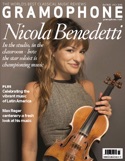Texte paru dans: / Appeared in: |
|
|
Outil de traduction (Très approximatif) |
|
|
Reviewer: Charlotte Gardner
Back in 2011, four years after
Reinhard Goebel’s Musica Antiqua Köln had disbanded, they issued a surprise
new premiere recording of trio sonatas by the little-known 17th-century
German composer Johann Friedrich Meister, from a 1695 collection entitled
Il giardino del piacere (Berlin Classics). The sonatas had apparently
been recorded in 2004 for a televised broadcast but then forgotten about,
and they were an entertaining bundle: better described as suites given their
multi-movement structure, they were stylistically varied with clear French
and Italian influences, and indisputably worthy of resurrection beyond their
sheer obscurity value. However, while Meister’s collection was 12-strong,
MAK had only recorded six.
Unsurprisingly, therefore, this disc is an absolute winner, Meister’s music shining in the warm, zingy and sweet playing from Ensemble Diderot, subtle ornamentation adding elegant extra gloss. The opening A major Sonata’s first movement sets the standard for the whole: an Adagio full of lovingly rendered dynamic swells, the tempo expansive but momentum-filled, which segues into a bright Allegro presto that slices the air with its crispness. The engineering is equally spot-on, instruments well balanced, with plenty of immediacy to the sound without going uncomfortably close. This and the earlier MAK recording make a super pairing. |
|
|
Consultez d'autres mois / Browse other months
|
|
|
|
|
|
Cliquez l'un ou l'autre
bouton pour découvrir bien d'autres critiques de CD |
|




